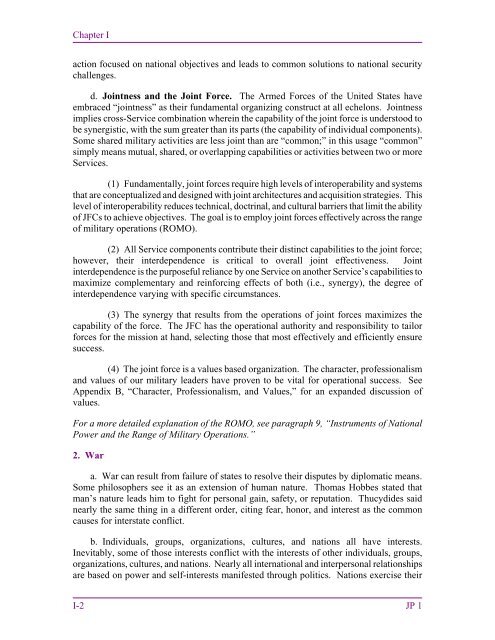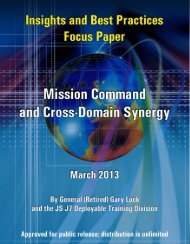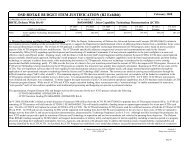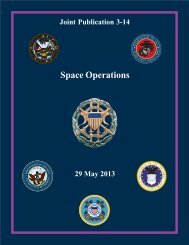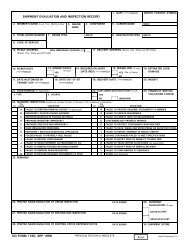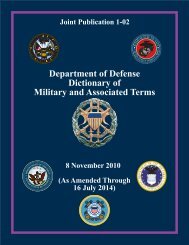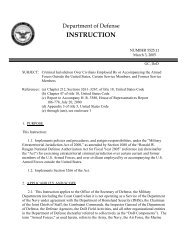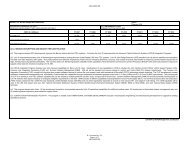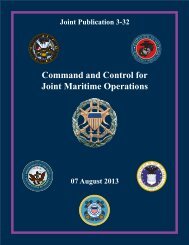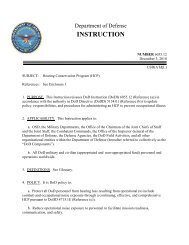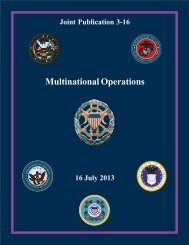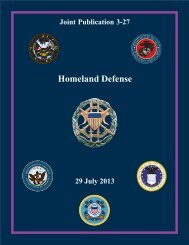JP 1, Doctrine for the Armed Forces of the United States - Defense ...
JP 1, Doctrine for the Armed Forces of the United States - Defense ...
JP 1, Doctrine for the Armed Forces of the United States - Defense ...
Create successful ePaper yourself
Turn your PDF publications into a flip-book with our unique Google optimized e-Paper software.
Chapter I<br />
action focused on national objectives and leads to common solutions to national security<br />
challenges.<br />
d. Jointness and <strong>the</strong> Joint Force. The <strong>Armed</strong> <strong>Forces</strong> <strong>of</strong> <strong>the</strong> <strong>United</strong> <strong>States</strong> have<br />
embraced “jointness” as <strong>the</strong>ir fundamental organizing construct at all echelons. Jointness<br />
implies cross-Service combination wherein <strong>the</strong> capability <strong>of</strong> <strong>the</strong> joint <strong>for</strong>ce is understood to<br />
be synergistic, with <strong>the</strong> sum greater than its parts (<strong>the</strong> capability <strong>of</strong> individual components).<br />
Some shared military activities are less joint than are “common;” in this usage “common”<br />
simply means mutual, shared, or overlapping capabilities or activities between two or more<br />
Services.<br />
(1) Fundamentally, joint <strong>for</strong>ces require high levels <strong>of</strong> interoperability and systems<br />
that are conceptualized and designed with joint architectures and acquisition strategies. This<br />
level <strong>of</strong> interoperability reduces technical, doctrinal, and cultural barriers that limit <strong>the</strong> ability<br />
<strong>of</strong> JFCs to achieve objectives. The goal is to employ joint <strong>for</strong>ces effectively across <strong>the</strong> range<br />
<strong>of</strong> military operations (ROMO).<br />
(2) All Service components contribute <strong>the</strong>ir distinct capabilities to <strong>the</strong> joint <strong>for</strong>ce;<br />
however, <strong>the</strong>ir interdependence is critical to overall joint effectiveness. Joint<br />
interdependence is <strong>the</strong> purposeful reliance by one Service on ano<strong>the</strong>r Service’s capabilities to<br />
maximize complementary and rein<strong>for</strong>cing effects <strong>of</strong> both (i.e., synergy), <strong>the</strong> degree <strong>of</strong><br />
interdependence varying with specific circumstances.<br />
(3) The synergy that results from <strong>the</strong> operations <strong>of</strong> joint <strong>for</strong>ces maximizes <strong>the</strong><br />
capability <strong>of</strong> <strong>the</strong> <strong>for</strong>ce. The JFC has <strong>the</strong> operational authority and responsibility to tailor<br />
<strong>for</strong>ces <strong>for</strong> <strong>the</strong> mission at hand, selecting those that most effectively and efficiently ensure<br />
success.<br />
(4) The joint <strong>for</strong>ce is a values based organization. The character, pr<strong>of</strong>essionalism<br />
and values <strong>of</strong> our military leaders have proven to be vital <strong>for</strong> operational success. See<br />
Appendix B, “Character, Pr<strong>of</strong>essionalism, and Values,” <strong>for</strong> an expanded discussion <strong>of</strong><br />
values.<br />
For a more detailed explanation <strong>of</strong> <strong>the</strong> ROMO, see paragraph 9, “Instruments <strong>of</strong> National<br />
Power and <strong>the</strong> Range <strong>of</strong> Military Operations.”<br />
2. War<br />
a. War can result from failure <strong>of</strong> states to resolve <strong>the</strong>ir disputes by diplomatic means.<br />
Some philosophers see it as an extension <strong>of</strong> human nature. Thomas Hobbes stated that<br />
man’s nature leads him to fight <strong>for</strong> personal gain, safety, or reputation. Thucydides said<br />
nearly <strong>the</strong> same thing in a different order, citing fear, honor, and interest as <strong>the</strong> common<br />
causes <strong>for</strong> interstate conflict.<br />
b. Individuals, groups, organizations, cultures, and nations all have interests.<br />
Inevitably, some <strong>of</strong> those interests conflict with <strong>the</strong> interests <strong>of</strong> o<strong>the</strong>r individuals, groups,<br />
organizations, cultures, and nations. Nearly all international and interpersonal relationships<br />
are based on power and self-interests manifested through politics. Nations exercise <strong>the</strong>ir<br />
I-2 <strong>JP</strong> 1


